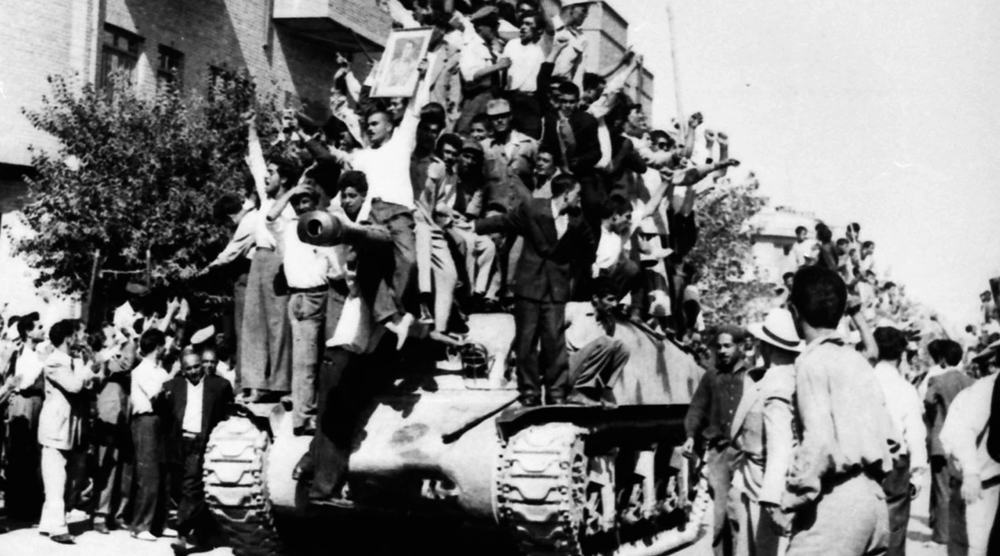Report shows how MI6 was given free hand in 1953 Iran coup
A report shows how an MI6 intelligence officer was allowed to spend as much money as he desired to overthrow Iran’s first democratically-elected government of Mohammad Mosaddeq and restore the Pahlavi regime in 1953.
“My brief was very simple,” said the officer, Norman Darbyshire, according to transcripts censored out of the 1980s Granada documentary, titled “End of Empire,” The Guardian revealed in a report on Sunday. “Go out there, don’t inform the ambassador, and use the intelligence service for any money you might need to secure the overthrow of Mosaddegh by legal or quasi-legal means,” the transcript went on.
The MI6 officer, who died in 1993, goes on to explain that he spent “vast sums of money, well over a million-and-a-half pounds,” adding, “I was personally giving orders and directing the street uprising.”
The Iranian premier, Mosaddeq had played a key role in the country’s 1951 movement that resulted in the nationalization of Iran’s oil industry, which had been mainly controlled by the British-owned Anglo-Iranian Oil Company (AIOC), now known as BP.
“[Former British] Prime Minister Winston Churchill opposed the rule of the country’s first democratic leader, Mohammad Mosaddegh, largely because it threatened Britain’s interests in Iran’s oil industry,” The Guardian likewise notes.
In August 1953, the British intelligence agency and its American counterpart, the CIA, initiated the coup by the Iranian military, setting off a series of events, including riots on the streets of the capital Tehran, which led to the overthrow and arrest of Mosaddeq.
The coup, which was followed by the temporary rule of CIA- and MI6-approved General Fazlollah Zahedi, enabled the monarch, Mohammad-Reza Pahlavi’s return from exile in Italy. It also consolidated the monarch's rule for the following 26 years until the victory of Iran’s Islamic Revolution in 1979, led by Imam Khomeini, which toppled the Pahlavi regime.
Mosaddeq, who was convicted of treason by a court martial after the coup, served three years in solitary confinement and eventually died under house arrest in exile in 1967.
The historic overthrow, though, is still given as a reason for the Iranians' mistrust of the UK and the US.
The censored transcript of the MI6 officer Darbyshire’s remarks was discovered by Taghi Amirani, a film director, who used it in a documentary that was released last August under the title “Coup 53.”
“Coup 53 now makes a clear case that the British were orchestrating an uprising, going as far as kidnapping, torturing, and paying for protesters to go out on to the streets of Tehran,” The Guardian writes.
“This coup shaped not only western relations with Iran for 60 years, but changed the Middle East. Imagine if there had been a democracy there,” Amirani was quoted by the paper as saying.
Experts say the upheaval, known in Iran as the 28 Mordad Coup, was aimed at making sure the Iranian monarchy would safeguard the West's oil interests in the country.
The MI6 and CIA’s role was first revealed in a 1985 news story by The Observer, The Guardian’s sister paper, but the report was suppressed. Nor did the “End of Empire” series get to feature either Darbyshire or his testimony.
‘All wars have rules. All of those rules have been broken’ by Israel
VIDEO | Report flags India’s violation of rights of Rohingya detainees
Turkey's foreign minister meets Syria's de facto leader in Damascus
'Next to impossible' to rescue patients from Gaza's Kamal Adwan Hospital: Director
VIDEO | Vietnam current prosperity
Report blames gasoil exports for shortage at Iranian power plants
VIDEO | Hind Rajab Foundation names Israeli war criminals vacationing after Gaza genocide
VIDEO | Australians rally for Gaza ahead of Christmas festivities











 This makes it easy to access the Press TV website
This makes it easy to access the Press TV website